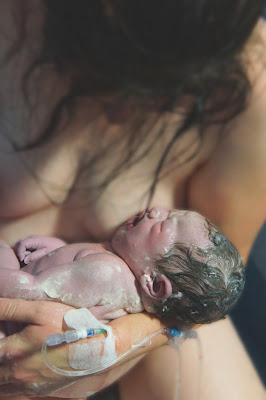Having a Natural Birth in Hospital - You have more choice than you think.
Louise David Private Midwife & Lactation Consultant.
If you follow me on Facebook, you'll know that I am a privately practicing (independent) midwife, and that I mostly attend home births. You'll also know that I share a lot of info about the safety and benefits of home birth over hospital birth. I share a lot of articles about how the hospital system often does a disservice to the pregnant and birthing woman and how intervention and medically managed births are the norm and poor outcomes, as far as her birthing plans and wishes, for the mother common.
This post is a little different. this post is about how achieving natural birth in hospital is possible and how you can best navigate the system to have great birth outcomes that don't just result in a healthy baby but a happy and empowered mum too.
1. Know the system and be prepared to stand your ground.
The norm in hospital is medically managed pregnancy and birth; tests are offered as routine not options, time restraints are put on labour and 3rd stage is actively managed, for example. Your birth plans may differ slightly or vastly from what is standard in the local birth unit. While I would like to point out that if you are aiming for a natural birth, your best place to achieve this is at home with a private midwife, we already know that's where I stand and this isn't what this blog is about.
Knowing that your wishes are not standard practice means you have to voice your desires and having a written plan to present to your carer is even more helpful. Your request may be met with some resistance, therefore it is important to have a thorough understanding as to why you desire what you do so that you can stand strongly and firmly in the belief that what you are choosing is the right choice for you.
At the end of the day, the issue of consent becomes very important. Know that you have the final say in all that is done to you and nothing can happen without your full and informed consent.
2. Have continuity of carer.
This means that ideally one person or one (small) group of people provide your care. Your philosophy and wishes become known and understood quite early on in your care and are carried right through out your pregnancy with no surprises at the end. For example, if you ask for a water birth when you're already in labour and it's the first time your carer has heard this request, don't be surprised if you're met with "oh no we can't offer that".
3. Have a known midwife for your birth.
Often in continuity of carer models, your care provider will follow you right through your pregnancy and also be the person who attends your birth. This is ideal and the birthing woman is secure in the fact she is with a known person she has come to trust. This is proven time and time again in the literature to result in better birthing outcomes.
4. If number 3 isn't possible have a known private midwife as a support person or hire a doula.
If it is not possible that the person caring for you in labour is someone you know and trust and someone that has previously been involved in your care, you can easily replace this void with an outside person. A private midwife who has done some or all of your antenatal care with you or a doula. The role of these people in a hospital birth environment is as a support person; someone who knows and supports your wishes and can advocate for you with the hospital staff.
5. Ask questions and trust your instinct.
One tool I used to teach in prenatal classes is the accronym BRAIN. The tool helps the user question, assess and rationalise that which is before them and come to a decision they feel at peace with.
B- what are the BENIFITS?
R- what are the RISKS?
A- what are the ALTERNATIVES?
I- what is your INTUITION telling you?
N- what if we do NOTHING?
Having the support of an educated individual beside you can help get the most out of this tool. Someone like a private midwife or a doula who can discuss the ins and outs of an intervention or a procedure and help you come to a decision that you can own.
Wishing you the best of luck on your birth journey. Wherever you may be birthing, whichever birth number this is is for you, trust yourself and your body.
 |
| Until next time, Louise x |
All photos taken my me, Louise David private midwife, lactation consultant and birth photographer.





Great post Lou. Wollongong's MGP is obviously an amazing model of care and meant that I could have three drug free waterbirths with my midwife by my side each time. Love what you've written and really think this model of care should be seen across more hospital platforms.
ReplyDelete